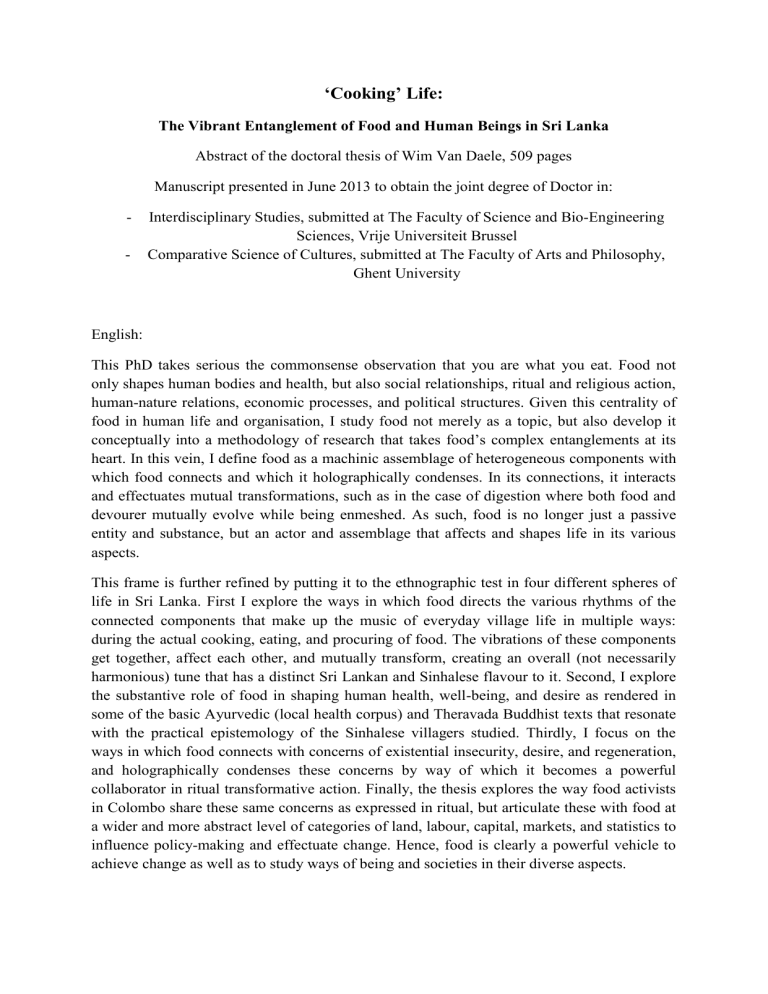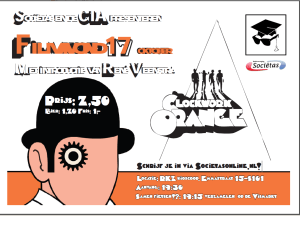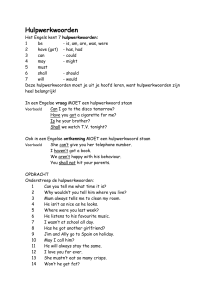
‘Cooking’ Life:
The Vibrant Entanglement of Food and Human Beings in Sri Lanka
Abstract of the doctoral thesis of Wim Van Daele, 509 pages
Manuscript presented in June 2013 to obtain the joint degree of Doctor in:
-
Interdisciplinary Studies, submitted at The Faculty of Science and Bio-Engineering
Sciences, Vrije Universiteit Brussel
Comparative Science of Cultures, submitted at The Faculty of Arts and Philosophy,
Ghent University
English:
This PhD takes serious the commonsense observation that you are what you eat. Food not
only shapes human bodies and health, but also social relationships, ritual and religious action,
human-nature relations, economic processes, and political structures. Given this centrality of
food in human life and organisation, I study food not merely as a topic, but also develop it
conceptually into a methodology of research that takes food’s complex entanglements at its
heart. In this vein, I define food as a machinic assemblage of heterogeneous components with
which food connects and which it holographically condenses. In its connections, it interacts
and effectuates mutual transformations, such as in the case of digestion where both food and
devourer mutually evolve while being enmeshed. As such, food is no longer just a passive
entity and substance, but an actor and assemblage that affects and shapes life in its various
aspects.
This frame is further refined by putting it to the ethnographic test in four different spheres of
life in Sri Lanka. First I explore the ways in which food directs the various rhythms of the
connected components that make up the music of everyday village life in multiple ways:
during the actual cooking, eating, and procuring of food. The vibrations of these components
get together, affect each other, and mutually transform, creating an overall (not necessarily
harmonious) tune that has a distinct Sri Lankan and Sinhalese flavour to it. Second, I explore
the substantive role of food in shaping human health, well-being, and desire as rendered in
some of the basic Ayurvedic (local health corpus) and Theravada Buddhist texts that resonate
with the practical epistemology of the Sinhalese villagers studied. Thirdly, I focus on the
ways in which food connects with concerns of existential insecurity, desire, and regeneration,
and holographically condenses these concerns by way of which it becomes a powerful
collaborator in ritual transformative action. Finally, the thesis explores the way food activists
in Colombo share these same concerns as expressed in ritual, but articulate these with food at
a wider and more abstract level of categories of land, labour, capital, markets, and statistics to
influence policy-making and effectuate change. Hence, food is clearly a powerful vehicle to
achieve change as well as to study ways of being and societies in their diverse aspects.
Nederlands:
Dit doctoraat vertrekt van het populaire gezegde dat je bent wat je eet. Het eten geeft niet
alleen vorm aan de lichamelijke aspecten en gezondheidsaspecten, maar bepaalt daarenboven
social relaties, rituele en religieuze aktie, mens-natuurrelaties, economische processen en
politieke structuren. Aangezien voedsel zo centraal staat in het menselijke leven en de
samenleving, bestudeer ik voedsel niet alleen als een onderwerp, maar ontwikkel ik het op
conceptueel niveau tot een methodiek van onderzoek dat de complexe verwevenheid van
voedsel centraal stelt. In dit kader definieer ik voedsel als een machinistische assemblage die
bestaat uit heterogene componenten waarmee voedsel zich verbindt en ze holografisch
condenseert. In deze verbindingen interageert voedsel en veroorzaakt het wederzijdse
transformaties, zoals bijvoorbeeld in het geval van vertering waarbij zowel de persoon als het
eten evolueren tijdens de verstrengeling. Voeding is dus niet zomaar een passieve entiteit of
een substantie, maar een actor en assemblage die het leven in haar verscheidene aspecten
affecteert en vormgeeft.
Deze conceptualisering wordt verder verfijnd door het te onderwerpen aan de etnografische
test in relatie tot vier verschillende levenssferen in Sri Lanka. Vooreerst exploreer ik de
wijzen waarop voedsel de verschillende ritmes van de verbonden componenten dirigeert die
tesamen de muziek van het alledaagse dorpsleven vormgeven op verscheidene manieren:
tijdens het eigenlijke koken, eten en vergaren van voedsel. De vibraties van deze componten
komen samen, beïnvloeden elkaar en transformeren waarbij ze een algehele (niet noodzakelijk
harmonieuze) toon produceren met een eigen Sri Lankaanse of Singalese smaak. Ten tweede,
bestudeer ik de cruciale rol van voedsel in de vormgeving van gezondheid, welzijn en
verlangen zoals beschreven in sommige Ayurvedische (lokaal medisch corpus) en Theravada
Boeddhistische basisteksten die resoneren met de praktische epistemologie van de Singalese
dorpelingen. Ten derde bestudeer ik de wijzen waarop voedsel zich verbindt met
bezorgdheden als existentiële onzekerheden, verlangen en regeneratie van het leven en hoe
het die holografisch condenseert waardoor het een krachtige medewerker wordt in rituele
transformatieve actie. Tenslotte kijkt de thesis naar hoe de Colombo voedselactivisten deze
rituele bezorgdheden delen, maar met voedsel articuleren op een hoger, abstract niveau in
concepten als land, arbeid, kapitaal, markten en statistieken om het beleid te beïnvloeden en
verandering te volbrengen. Voedsel is dus duidelijk een krachtig middel om verandering
teweeg te brengen en ook zijnswijzen en samenlevingen in hun verscheidene aspecten te
bestuderen.












